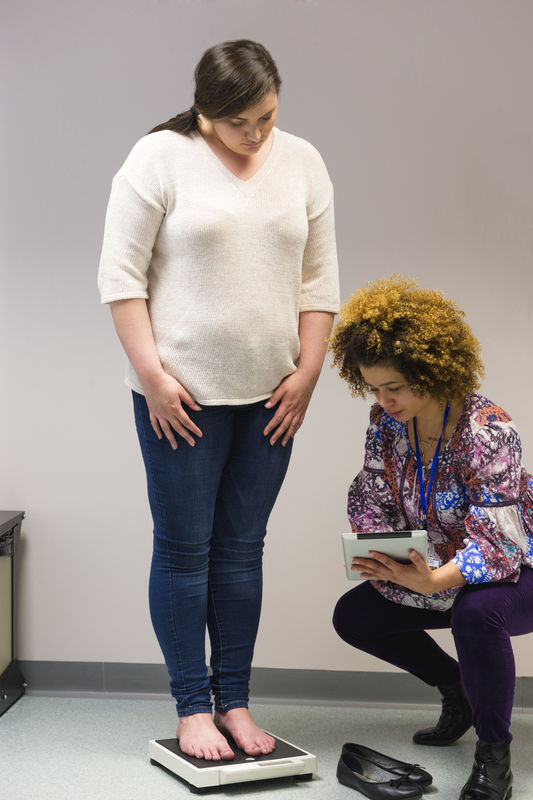Have you been to the doctor recently? You probably should have. But more often than not, people have their reasons for not regularly going to see a physician. For some it's money, for others it's scheduling...but for a lot of people it's for a fear of being judged.
There's a new trend coming to light where patients feel they are being discriminated against because of their weight. It's estimated that 65% of patients are told by their doctor that the "only option" to fix their problem is by losing weight. That, in itself, is a problem.
While it's absolutely fair to say there are people who would benefit from losing weight, to assume that it cancels out all other ailments would be wrong.
Lynn Behnke was in a car accident which completely destroyed her foot. She needed five operations and was in so much pain she had to miss work. After some time, she decided to go back to her surgeon to try and get some help.
He told her to go on a diet.
"If a skinny person came in with that kind of pain, they would have been given pain medication," said Behnke. At 5ft6 and 200lbs, she was considered obese and her complaints of pain were ignored.
Behnke 'fired' her doctor and went to find a new physician once the pain was too much to handle.
"I told my new doctor, 'I suppose this will get better if I lose weight.' He said, 'Not necessarily,' " Behnke said. "He said, 'You've had nerve damage, joint damage, tissue damage and muscle damage; it's not necessarily going to go away.' "
"It's like they make the diagnosis as soon as they see you walk through the door," says Miki Merritt, Vice President of the local chapter of the National Association to Advance Fat Acceptance.

This isn't a one-off case either. Yale University and the University of Pennsylvania both conducted studies into these claims of attributing all problems to weight and their results were rather concerning.
Continue reading to find out what the studies found, and to read other stories of misdiagnosis due to dismissal surrounding a patient's weight. One woman could have died if they hadn't caught her actual illness in time.
"What's concerning is that people who are overweight and obese should probably be seeing their physicians more often, not less, because of their increased health risks," said Rebecca Puhl, director of research and anti-stigma initiatives at Yale University's Rudd Center for Food Policy and Obesity.
The studies conducted at Yale of U of P indicate that more than half of the 620 physicians interviewed admitted to not only dismissing obese patients as "unattractive" and "noncompliant," but also saw them as lazy and stupid. These doctors were more likely to dismiss an overweight or obese patient's concerns as weight problems and not conduct further tests to find a possible source of pain or illness.
Dr. Scott Kahan says there's room for doctors to improve, both in how they treat patients and how they talk to them as well.
"Some doctors are egregiously nasty and inappropriate with their larger patients," Dr. Kahan says. "A patient of mine once went to urgent care short of breath only to be told that it was because she had "˜too much fat on her chest.' Later, at the emergency room, they discovered she had a pulmonary embolism and needed anticoagulants. She's lucky to be alive."
Another problem that arises is when patients go to the doctor for one problem, and leave with a diet.
"So often, when doctors bring up weight, they aren't actually treating what patients are complaining about," says Dr. Natalie Borero. "I went in for a sore throat, and I came out with a diet. I think it goes to our idea that somehow doctors are immune from or outside of these moral judgments. They're mired in them as much as anyone else "” in fact, even more than everyone else."
Plus-size model Elly Mayday shared her misdiagnosis experience to try and make something clear: just because you're overweight doesn't mean nothing else is wrong with you.

"I was working as a flight attendant and had been for 2 years when I started to really experience the pain. It was my lower back, and they would tell me to workout my core. "˜That's why your back is hurting, it's because your core is not strong enough. You don't feel good because you're overweight.' That wasn't my problem.
"I'd have a yeast infection or a urinary tract infection and they would give me antibiotics or painkillers and send me home. Finally, when a doctor opened up and took patients, I got in there and she sent me in for a CT Scan. They saw a cyst on my ovaries and they couldn't see my left ovary. They were like, "˜It's just a cyst.' I remember calling my mom and saying, "˜It's just a cyst, it's not a big deal.' But it was a big deal. Five days later. they diagnosed me with stage three ovarian cancer."
Click to the next page to read about a teenager who suffered for a full year due to misdiagnosis.
19-year-old Samantha Harvel visited an Ear, Nose, and Throat doctor three years ago for problem with sleep apnea and snoring.
"I was 5'3 and 180 pounds or so at the time," she said. "I had been having trouble with horrible snoring and sleep apnea, so I was looking to get my tonsils taken out. I had strep throat a lot as a child so this had been an option for a while. We went to an ENT doctor to schedule a tonsillectomy. He didn't even examine me or ask about medical history. He came into the room and told me that the only thing that would help me was losing weight immediately. Thirty pounds, to be exact."
"I felt horrible," she continued. "I knew that I was large, but I had never thought of myself as huge until that point in my life. Ever since then I have associated my body with so much shame."
Harvel struggled to lose weight for a full year, but none of it was helping her throat.
"I had an anxiety breakdown caused by the sleep apnea and was scared of physical symptoms caused by the swollen tonsils," she said. "I was convinced I was choking at this point. My family finally found a doctor who would take them out. The ENT who took out my tonsils said they were some of the biggest he'd ever seen. My breakdown ended, but although I still suffer from lingering symptoms, I haven't snored a single night since. I'm about 50 pounds heavier than I was at my first visit."
While doctors try to be helpful, often times the way they explain issues or accuse patients of having poor diets leading to unrelated issues is becoming a big problem.
"Medical professionals' underlying belief systems, driven by our thin-obsessed, anti-fat culture, can and do make their interactions with patients with obesity less productive," says Dr. Kahan.
Doctor Natalie Boero, a sociology professor, says focusing on obesity is actually harmful to overweight pateients.
"We're so caught up in conflating weight and health, but there's plenty of evidence to show that weight and health are not correlated," she said. "Every illness that a fat person gets, you also see it in thin people."
The studies conducted have shown another troubling trend as well: women are putting off doctors appointments or necessary care for fear of being 'fat-shamed' by their doctor. One study from 2006 made this very clear.
"These barriers [included] disrespectful treatment, embarrassment at being weighed, negative attitudes of providers, unsolicited advice to lose weight, and medical equipment that was too small to be functional," the study's researchers concluded. "Obese women reported that they delay cancer-screening tests and perceive that their weight is a barrier to obtaining appropriate health care."
Have you ever been misdiagnosed because of your weight? Let us know.




